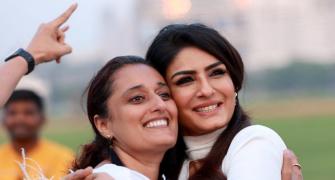'When something like this happens, it's just like all the weight and all the time that there was no work and the auditions were not cracking, you feel it's just worth it.'

In Karmma Calling, Namrata Sheth and Varun Sood got to do what every Bollywood newcomer aspires for -- Glitz, glam and drama. Describing it as 'dream experience', the young actors shared screen space with Raveena Tandon in Director Ruchi Narain's twisted tale of revenge.
What was it like working with Raveena?
"What made me a bigger fan of Raveena ma'am was the fact that she made sure that I wasn't nervous around her at all. She normalised everything. She made sure that every actor was comfortable around her."
Namrata and Varun get candid about their take on life with Mayur Sanap/Rediff.com.
What drew you to this project and what was the kick of acting in it?
Namrata: I've been a fan of the original show.
The minute I got to know that they were auditioning for the Indian adaptation, I was instantly excited.
I really wanted the part.
Just knowing that a show that I've loved is being made for Indian audiences was very exciting in itself. Then to get to play a character that is so layered and different from myself and a character that I've grown up watching to be able put my own take on it and do it in my own way, was just a dream experience.
Varun: For me, it was more of an opportunity that I needed. I needed somebody to trust and believe that I can pull off a big show like this.
I think that was my number one driving factor towards the show.
Obviously, the character and the story are fantastic. We have all seen it work in Hollywood. When I got to know there's an Indian adaptation to it, I thought that once we Indianise it, the flavour of our country will make it richer and more entertaining.
I was quite excited to play the Indian version of Daniel Grayson (the character played by Josh Bowman in Revenge).

The biggest draw of the show is Raveena Tandon. As her co-stars, what was the fanboy/fangirl moment for you on the sets?
VarunL I've grown up watching Raveena ma'am. Andaz Apna Apna has to be my favourite film. That's my comfort film.
To share the same screen space with her was unreal.
I was very scared, very nervous. I didn't want to mess up on set.
I didn't want her to question my existence on set.
So I was very well prepared.
What made me a bigger fan of Raveena ma'am was the fact that she made sure that I wasn't nervous around her at all.
She normalised everything.
She made sure that every actor was comfortable around her.
And she built on every actor.
She made sure that every artist in a scene performed to their optimum so that the scene turns out great.
Namrata: We've all grown up watching her. She's an icon.
To know that we were going to be performing in front of her, we all really wanted to make sure that we were well prepared.
We knew what we were doing by the time we got on the set because you don't want to mess up in front of somebody like that. But she never lets you feel intimidated.
She knows that we're new.
She knows that we're just figuring things out.
She'll be giving us sometimes tips on how we can make things better.
She's just a sheer professional.

All the characters in this show are so layered and complex. What was your brief from Director Ruchi Narain and how did that help you to play your characters?
NamrataL It is difficult because it takes a lot of understanding of the emotional state of that character.
My character Karma is going through a lotm but she doesn't let any of it show on her face. So there was that fear of it looking flat, or she's just being one dimensional.
I had to do a lot of workshops to understand where her sadness is coming from.
It took a lot of conversations with Ruchi. Her brief was not to be myself because I'm nothing like the character. But the minute she felt that I was in a place where I could execute the character, she trusted me. She kept telling me that now you know Karma better than me.
But she guided me up to that point where I could feel like I was the character.
Varun: My character Ahan is very relatable.
The fact that he comes from such a rich family; he is like the Prince of Alibaug and still so humble, so innocent, and still in touch with his emotional side.
I love the fact that I could relate to a lot of traits of Ahan overall.
Do you believe in the concept of karma? Can you recall a moment from your life where you felt like it is a real thing?
Varun: I'm experiencing right now how karma has really worked for me.
I've tried to be a good person to everybody in my life, and I've treated them the way I would have liked them to treat me.
As a result, I have bagged such a big show.
That's how karma plays out.
If you do good, good things will happen to you.
Namrata: I agree. You have to just carry out your life in the best way that you can.
That's not to say that mistakes won't be made and people won't be hurt in the process sometimes. But as long as you're aware of your actions and how they're affecting people, I don't think you have to really be fearful of anything.
Having a strong moral compass is most important.

From being the outsiders making a mark in this industry to headlining a big scale show. How do you would sum up your journey?
Varun: It's a great feeling that somebody trusted you with their creation. To be part of such a big show is surreal, overwhelming.
Every day I wake up, I'm thanking God and all my loved ones that they stuck by me in this process. Because it's not easy, right?
Once you've decided to be an actor, and have no connections in the industry, you don't really know which path to walk on.
And when something like this happens, it's just like all the weight and all the time that there was no work and the auditions were not cracking, you feel it's just worth it.
You just hope that the audience also likes you, so that more people out there can believe in you. And then you become a bankable actor.
Namrata: It is really fulfilling and gratifying because it's been a journey to get here. It's taken a lot of resilience and perseverance and reminding yourself that the right opportunity will come your way when you're ready for it.
Looking back now, I think everything makes so much sense, the things that didn't work out, and that I was upset about in that moment.
In hindsight, you see that there is such a thing as destiny.

Since this is the age of social media, does it get challenging for young actors to maintain the balance between their work and social media personality?
Namrata: It's very stressful. It doesn't come naturally to me.
It takes a lot of effort to make sure that I'm being active on social media. It takes a lot of forcing from my team.
But I am learning to enjoy it.
It's part and parcel of the job.
We have to adapt to changing times.
So you know, you try to keep a balance, keep certain things private and use social media as a platform to showcase work.
Varun: Social media is very difficult to maintain: To post the right thing and to keep it engaging.
But my idea of social media has been just be yourself.
If you don't post that much, you don't post that much. And that's your reality.
The more authentic you are, the more relatable you are to the people who are visiting your profile.

How do you react to all the attention you receive from the opposite sex?
Varun: It's flattering. Validation as human beings is something that we all need. And it's very sweet.
A few of the messages that we get on a regular basis, it's like a complimentary thing. Every time you work, people like you and they become your fans, and you get compliments from both the same sex and the opposite sex.
I would like to have it a lot more. I like the feeling, for sure.
Namrata: Yeah. It's not as much the opposite sex as just audiences in general. You want everybody to look at you and like what you're doing. If a performance of yours made them feel something, that's the biggest compliment you can get.
At the end of the day, as actors, we do seek that validation from the audiences. Men, women, everybody, we want love from wherever we can get it.










